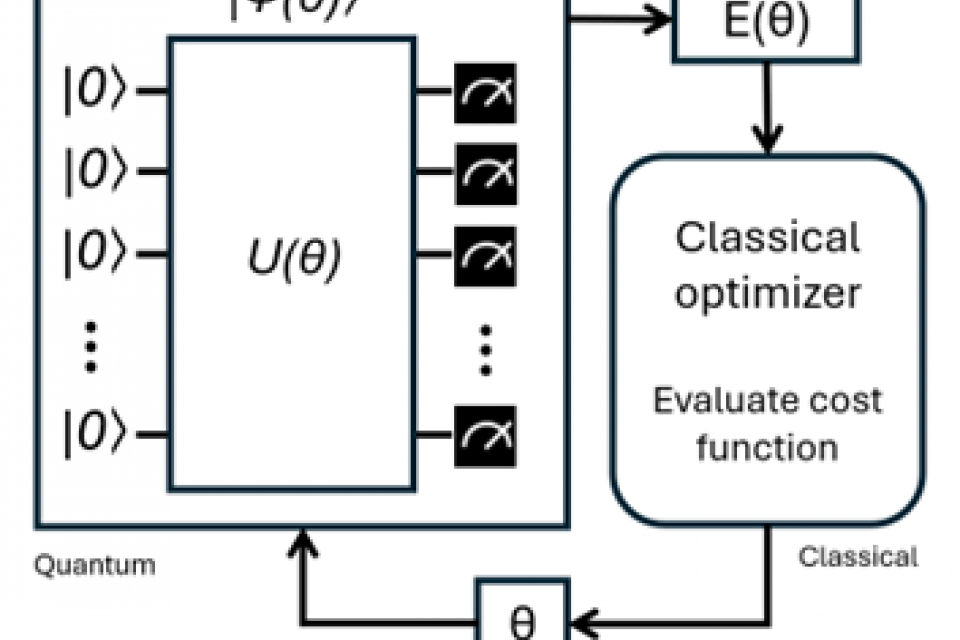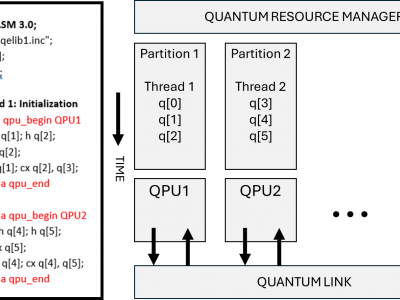Datasets
Standard Dataset
Static and adaptive quantum circuits for VQE ansatz in hypergraphic partitioning
- Citation Author(s):
- Submitted by:
- WALDEMIR CAMBIUCCI
- Last updated:
- Wed, 10/09/2024 - 17:44
- DOI:
- 10.21227/tc8b-ev76
- Data Format:
- License:
 189 Views
189 Views- Categories:
- Keywords:
Abstract
As quantum computing advances, there is a growing need for sophisticated computational methods that efficiently leverage quantum resources. This paper investigates the integration of adaptive quantum circuits with the Variational Quantum Eigensolver (VQE) algorithm, proposing Adaptive VQE as an enhanced approach for dynamically constructing quantum ansätze. We explore the impact of adaptive quantum circuits in multi-Quantum Processing Unit (QPU) environments and address the challenges associated with implementing adaptive VQE in distributed settings. While VQE is a promising algorithm for solving eigenvalue problems on Noisy Intermediate-Scale Quantum (NISQ) devices, it faces limitations such as circuit depth and noise sensitivity inherent in static circuit designs. By employing adaptive quantum circuit templates, our approach dynamically adjusts the quantum ansatz based on real-time feedback, significantly reducing circuit complexity and improving convergence rates compared to traditional static VQE implementations. Furthermore, anticipating the future context of multi-QPU architectures, we present a novel algorithm for circuit partitioning of adaptive quantum circuits. This method creates manageable subcircuits through a hypergraph partitioning approach, considering specific features and patterns from adaptive circuits. It enables parallel processing and enhances scalability for large-scale quantum applications. To support experimentation and further research, we provide a dataset containing files created for experiments with adaptive VQE ansätze, utilizing the adaptive quantum circuits approach. Through a series of comparative experiments with static and adaptive circuits, we explore the advantages of Adaptive VQE over static VQE in terms of circuit dimensions, resource utilization, and flexibility. This research offers comprehensive insights and guidelines for transitioning from static VQE to Adaptive VQE, emphasizing the benefits of adaptive circuits and the critical role of multi-QPU environments in optimizing quantum computations.
Overview
The dataset contains a collection of quantum circuit files located in two directories:
- `Folder \vqe_adaptive`: This directory contains examples of adaptive quantum circuits for the Variational Quantum Eigensolver (VQE) ansatz. The circuits are designed for different numbers of qubits, ranging from small to large-scale systems, and are intended to be executed on various target quantum computing platforms.
- `Folder \vqe_static`: This directory holds examples of static quantum circuits for the VQE ansatz, corresponding to similar qubit configurations and platforms as the adaptive circuits.
Purpose of the Dataset:
The dataset is designed to facilitate comparative studies and experiments between adaptive and static quantum circuits within the context of the VQE algorithm. By providing circuit implementations for varying qubit counts and target platforms, the dataset enables researchers to:
- Analyze the performance differences between adaptive and static circuits.
- Understand the scalability and resource requirements of each approach.
- Explore the benefits and challenges associated with adaptive quantum circuits in practical VQE applications.
Adaptive Quantum Circuits vs. Static Circuits in VQE:
- Static Quantum Circuits:
- In static VQE implementations, the quantum circuit (ansatz) has a fixed structure throughout the execution of the algorithm.
- The ansatz is predefined with a specific sequence of gates and does not change in response to intermediate measurements or computational feedback.
- Static circuits may suffer from limitations such as increased circuit depth and resource consumption, especially for complex systems requiring large ansätze.
- They can be less efficient in terms of convergence rates and may require more optimization iterations to reach the ground state energy.
- Adaptive Quantum Circuits:
- Adaptive circuits introduce dynamic elements into the quantum circuit construction, allowing the ansatz to adjust based on real-time feedback from measurements or classical computations.
- They employ control flow operations such as `if`, `switch`, `for`, and `while`, enabling the circuit to modify its behavior during execution.
- Adaptive circuits can reduce circuit depth and complexity by tailoring the ansatz to the specific problem instance and focusing computational resources where they are most effective.
- They often exhibit improved convergence rates and can achieve better performance on Noisy Intermediate-Scale Quantum (NISQ) devices due to reduced susceptibility to noise and decoherence.
Impact in the Context of VQE Algorithms
- Circuit Efficiency and Resource Utilization:
- Adaptive circuits can lead to more efficient use of quantum resources by eliminating unnecessary gates and operations.
- They can adaptively select measurement bases and optimize the number of measurements required, reducing execution time and resource consumption.
- Scalability:
- The adaptive approach facilitates scalability to larger qubit systems by managing circuit complexity dynamically.
- By partitioning circuits and leveraging constructs like loops and conditional statements, adaptive circuits can be more manageable for higher qubit counts compared to their static counterparts.
- Convergence and Accuracy:
- Adaptive VQE circuits can achieve faster convergence to the ground state energy by adjusting the ansatz in response to intermediate results.
- They can improve the accuracy of the VQE algorithm by focusing on the most significant components of the Hamiltonian and adapting measurement strategies accordingly.
- Flexibility and Customization:
- Adaptive circuits offer greater flexibility in designing quantum algorithms, allowing for customization based on the specific problem and hardware constraints.
- They enable the integration of problem-specific knowledge into the ansatz construction, potentially enhancing algorithm performance.
Dataset Contents
- Circuit Files:
- The dataset includes OpenQASM 3 files for both adaptive and static circuits.
- Circuit files are named according to the number of qubits and whether they are adaptive or static (e.g., `vqe_adaptive_qiskit_4.qasm`, `vqe_static_qiskit_4.qasm`).
- Variability in Qubit Counts:
- Circuits are provided for a range of qubit counts, allowing for experiments across different system sizes.
- This range enables analysis of how circuit performance scales with the number of qubits.
- Target Platforms:
- The circuits are designed to be compatible with various quantum computing platforms, taking into account the supported gate sets and features like mid-circuit measurements and classical control flow.
Applications and Experimental Use
- Performance Benchmarking:
- Researchers can use the dataset to benchmark the performance of adaptive vs. static circuits on simulators or actual quantum hardware.
- Comparative metrics may include execution time, circuit depth, gate counts, convergence rates, and fidelity of results.
- Algorithm Development:
- The dataset serves as a foundation for developing and testing new adaptive strategies within the VQE framework.
- It provides practical examples of how adaptive constructs can be implemented in quantum circuits.
- Educational Purposes:
- The circuits can be used as teaching tools to demonstrate the differences between adaptive and static quantum circuits in quantum computing courses or workshops.
- They illustrate the practical application of advanced OpenQASM 3 features and adaptive quantum circuit design.
Conclusion
This dataset offers valuable resources for exploring the impact of adaptive quantum circuits in the VQE algorithm. By contrasting adaptive and static circuit implementations across various qubit configurations and platforms, researchers can gain insights into the advantages of adaptive approaches in terms of efficiency, scalability, and performance. The dataset not only facilitates experimental comparisons but also contributes to the advancement of quantum algorithm development and optimization techniques in the era of NISQ devices.
Dataset Files
- Adaptive quantum circuits for VQE ansatz, using 'for' and 'swtich case' instructions vqe_indep_adaptive_switch_for.zip (7.53 kB)
- Static quantum circuits for VQE ansatz, for independent gates vqe_static_indep.zip (12.50 kB)
- Static quantum circuits for VQE ansatz, for ibm platform and native gates vqe_static_nativegates_ibm_opt0.zip (15.07 kB)
- Static quantum circuits for VQE ansatz, for quantinuum platform and native gates vqe_static_nativegates_quantinuum_opt0.zip (17.55 kB)








